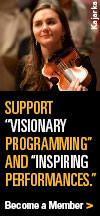One World Symphony News
An Unforgettable Encore At The Town Hall
On March 26, 2006 at 4:00pm, One World Symphony and Sung Jin Hong made their debut at New York City's historical Town Hall. The program, American Favorites: Bernstein & Gershwin, included Bernstein's music from West Side Story (Symphonic Dances and Concert Suite No. 1) and Gershwin's An American in Paris and Rhapsody in Blue. The concert was an enormous success-all 1,498 seats were sold! Soloists included Elizabeth Eiel and Colm Fitzmaurice, singing selections from West Side Story, and Lloyd Paguia Arriola as the piano soloist for Rhapsody in Blue.
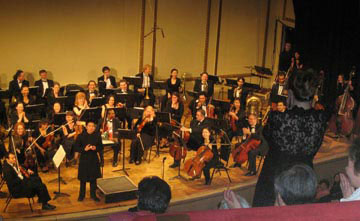 The
performance was thrilling. The audience was youthful and enthusiastic.
The audience members were invited to participate in Bernstein's Symphonic
Dances from West Side Story. After the last majestic
notes of Gershwin's Rhapsody in Blue, the audience rose
to their feet in a five-minute standing ovation.
The
performance was thrilling. The audience was youthful and enthusiastic.
The audience members were invited to participate in Bernstein's Symphonic
Dances from West Side Story. After the last majestic
notes of Gershwin's Rhapsody in Blue, the audience rose
to their feet in a five-minute standing ovation.
The applause was sure to last longer had not the Conductor and Artistic Director silenced it by addressing the crowd. In front of over 1,500 people he got down on one knee and asked Adrienne Metzinger, managing director and co-founder of One World Symphony, to marry him. The couple, who had been dating for nearly six years, started the symphony orchestra together five years ago.
At this tremendous proposal the audience again went wild! Clapping, cheering and crying! Upon accepting, the shocked and surprised Metzinger was escorted to the stage from her balcony seat by Tim Leininger, the orchestra manager. On the stage, Hong once again got down on his knee and placed the ring on Metzinger's finger. The couple embraced and was warmly met by audience members and musicians bestowing their congratulations.
Wedding date and location are not set, but Town Hall Executive Director Larry Zucker propositioned, "How would you like to have your wedding at The Town Hall?"
![]() Metropolitan Diary: The New York Times on the Sold-out Town Hall Debut
Metropolitan Diary: The New York Times on the Sold-out Town Hall Debut
Dear Diary:
On March 26, my husband and I and our friends went to Town Hall to hear One World Symphony perform the music of Gershwin and Bernstein.
At the end of a superb performance, after the applause died down, the conductor, Sung Jin Hong, began to address the audience. I assumed he was either going to announce an encore or urge the audience to become subscribers.
To my and everyone's amazement, he spoke of his commitment to the love of his life, Adrienne Metzinger, produced a small box from his tuxedo and, in front of a capacity audience, asked his love to marry him.
The audience broke into applause. The object of his affections rose to her feet, and overcome by emotion, repeatedly nodded yes. She was escorted to the stage, whereupon the conductor got down on his knees and placed the ring on her finger. The proposal was sealed with a kiss and an embrace.
Quite an encore.
Ellen Fish
March 2006
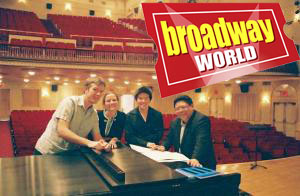 Town Hall Presents One World Symphony: Broadway World's Feature Article on One World Symphony's Sold-out Debut at The Town Hall
Town Hall Presents One World Symphony: Broadway World's Feature Article on One World Symphony's Sold-out Debut at The Town Hall
Wednesday, March 22, 2006
by
Michael Dale
When it comes to musically defining the spirit of New York City, few composers can match the contributions of George Gershwin and Leonard Bernstein. Gershwin's tricky syncopations captured the erratic energy of a 1920's city that was establishing itself as the artistic capital of the country. Bernstein gave a symphonic maturity to everyday events like sailors gleefully exploring Manhattan or teenagers feeling the passion of first love.
This coming Sunday at Town Hall, New Yorkers will have the opportunity to hear over 60 musicians perform some of the greatest works of these two masters, as The One World Symphony performs Gershwin's Rhapsody In Blue and An American in Paris, along with a vocal suite and a symphonic arrangement of selections from West Side Story.
Now in its fifth full season, The One World Symphony is an uncommonly youthful ensemble of accomplished musicians, with most members between the ages of 22 and 32, including Artistic Director and Conductor Sung Jin Hong. I asked Hong what we could expect from Sunday afternoon's program and he offered up the following tantalizing preview:
One World Symphony's Town Hall debut will feature two of America's most celebrated composers -- Gershwin and Bernstein. One does not have to appreciate just jazz, pop, rock, classical, or music theater to enjoy An American in Paris, Rhapsody in Blue and West Side Story. These American staples in both the classical, jazz and even popular film industries have been loved by all ages and various cultures from around the world. These works by Gershwin and Bernstein brought American music to life, found its youthful energy and its conviction, and began to embrace its potential.
First, One World Symphony consists of classically trained musicians from many of the prestigious conservatories around the world who are also active musicians in the jazz, pop, funk, rock scenes. Specifically, the audience members of Town Hall will experience a live orchestra of 60 musicians and vocal soloists. When I visited Town Hall a week ago to discuss some details with one of the stage workers, he asked me if we will use any sound equipment, speakers, microphones, or virtual orchestras. My answer was simple: "Our musicians are young, passionate professionals and unplugged" (speaking of which, we will perform U2 fully-orchestrated and unplugged later in June in Brooklyn Heights).
We will begin the program with Gershwin's An American in Paris. How are our musicians of 60 and I going to interpret and perform this hip, jazzy symphonic poem? Are we going to perform this work in a traditional American or New York style -- incredibly rhythmic, driven, edgy, and relentlessly syncopated? We can also perform it relating to the French style -- dreamy and subtle (similar to many French Impressionists), blended, lightly articulated, poetic. Gershwin did compose part of An American in Paris when he walked the streets of Paris and drank with Ravel. Our decision may come down to how are the taxi horns, which is part of the enormous percussion section, going to function. Are the taxi horns going to play as loudly and obnoxiously as possible, resembling our very own New York City cab drivers, or are they going to blend with the rest of the orchestra in a more polite manner? We may demonstrate both ways of playing the taxi horns and have our audience members at Town Hall decide. In the spirit of American idealism, you can say One World Symphony encourages Democratic practice.
Then, we will continue with Bernstein's Symphonic Dances from West Side Story, a thirty minute work that includes most of the main themes from Bernstein's extraordinary and ground-breaking musical theatre or musical opera. Our audiences will be in for a surprise treat during our performance of Symphonic Dances. The only clue I can share is that our audience members will participate in the music-making. How? One will discover at the concert.
After the intermission, we will focus on our soloists performing the two celebrated composers who lived in our very own city. Elizabeth Eiel as Maria and Colm Fitzmaurice as Tony will be our vocalists performing a concert suite from West Side Story. How are these fine young vocalists going to perform West Side Story? Are they going to resemble the original and youthful Broadway cast, Bernstein's recording with Kiri Te Kanawa and Jose Carreras, or find their own unique voice? On a side note, our vocal soloists were the winners of a highly competitive audition process held last November, where there were more than 300 vocal applicants and three call-back rounds.
Lloyd Arriola, our piano soloist will join the symphony to celebrate and embrace the infinite styles of music with Gershwin's Rhapsody in Blue.
As an audience member, I've wondered why do the performers only relax and perform freely and enjoy themselves when they are performing an encore? One of the many delights of One World Symphony's Town Hall debut program will be similar to an "encore." There will exist a constant spontaneity throughout the program -- the surprise factor for audience as it gives the musicians the opportunity to share another facet of our music-making, that may be more intimate, impulsive, and improvisational -- simultaneously.
I would like to dedicate One World Symphony's Town Hall Debut concert to Michael "The General" and Kathleen Rosenberg. We first met when they attended One World Symphony's tsunami benefit concert January 2005, in which we raised thousands of dollars for our Asian neighbors. They were inspired by the concert and invited us to perform at The Town Hall. The One World Symphony staff and artists are honored and thrilled to be sharing our love of music with The Town Hall.
May 2006
 Symphony Plays U2: Brooklyn Paper's feature article
Symphony Plays U2: Brooklyn Paper's feature article
by Kevin Filipski
The Brooklyn Paper
For the final concert of its fifth season, Ditmars Park-based One World Symphony celebrates the memory of a passionate musical artist with the first James Coleman Young People's Concert on June 2 at St. Ann and the Holy Trinity church in Brooklyn Heights.
Coleman, the 33-year-old principal violist of the orchestra, died last year of cancer; in his honor, the ensemble's artistic director and conductor Sung Jin Hong put together a program that memorializes Coleman with uplifting music old and new.
Opening the concert is music by Irish rockers U2 in world-premiere orchestral arrangements by One World Symphony resident composer Jihwan Kim. Three of the group's most spiritual songs are included: "One," "Pride" and "Where the Streets Have No Name."
Following a performance of Gustav Holst's sturdy classical warhorse, "The Planets," the concert ends with another world premiere, Stanley Grill's "Pluto," which could be heard as a continuation of Holst's popular work. ("The Planets" only has seven movements -- "Earth" is omitted -- because Pluto had not yet been discovered when it premiered in 1918.)
Hong told GO Brooklyn that 20 kindergarten and first-grade violin students from The Promise Academy in Harlem (pictured) will play "the relentless ostinato rhythm from Mars."
"It will truly be a Young People's Concert!" said Hong.
 African Sojourn: Brooklyn Paper's feature article on OWS's Egyptian program
African Sojourn: Brooklyn Paper's feature article on OWS's Egyptian program
by Kevin Filipski
The Brooklyn Paper
Finishing its current season on a stylish note, One World Symphony will travel all the way to Egypt for its final 2006 concert.
Ancient Egypt has caught the eyes (and ears) of composers over the centuries, and One World Symphony's June 23 concert will showcase two of the most famous operas set in North Africa: Handel's "Julius Caesar in Egypt" and Verdi's "Aida."
Handel's "Julius Caesar in Egypt," which had its world premiere in London in 1724, is a splendid vehicle for supremely talented singers: indeed, three of the most celebrated castrati of the day sang at its first performance.
That obviously won't be the case on June 23, but then again it won't have to: OWS conductor Sung Jin Hong has consistently shown an ability to select singers who can handle the music being performed, no matter how challenging. In that respect, the excerpts from "Aida" (which actually had its premiere in Cairo in 1871) should emerge triumphant as well.
Mezzo-soprano Ainsley Ryan will sing the role of Sesto in "Julius Caesar in Egypt."
Illinois Wesleyan University: Alum Proposes During His Symphony's Sold-out Performance
Sung Jin Hong, class of 1997, is the founder, conductor, and artistic director of One World Symphony in Brooklyn, N.Y.
He delighted his audience by proposing to Adrienne Metzinger, managing director and co-founder of One World Symphony, during the symphony's sold-out Town Hall debut in New York City this spring.
According to his biography at oneworldsymphony.org, Hong served as music director of IES Singverein in Vienna, and most recently, he was guest conductor of Lyrique-en-mer in France, where he conducted operas and concerts. He has guest-conducted Mannes Student Orchestra, the Manhattan Opera Ensemble, Western Illinois University's Cello Choir, Illinois Wesleyan's New Music Players, and the Manhattan School of Music Symphony, where he had the great honor of conducting in a concert with Maestro Kurt Masur.
He has also served as music director of Peoria Sinfonietta and Peoria Players Theatre for seven consecutive years; assistant conductor of Twin Cities Ballet Company (where he led complete productions of The Nutcracker), Regina Opera Company, and New Amsterdam Symphony Orchestra; and chorusmaster of New York Symphonic Arts Ensemble.
An advocate of new music, Hong has conducted works by John Corigliano, George Crumb, and Joan Tower. Hong has premiered numerous compositions by Pedro d'Aquino, John Craven, James Cross, Jerry Devore, Kyle Gann, Stanley Grill, Leonard Goldfine, Sean Hickey, and Margarita Zelenaia. His opera conducting credits with full orchestras include Cosi fan tutte, Le Nozze di Figaro, Don Giovanni, Carmen, Falstaff, La Traviata, La Boheme, Hansel and Gretel, Dido and Aeneas, Venus and Adonis, The Merry Widow, and world-premiere opera Knossos: The House of the Double Axe, by James Cross.
Hong earned his bachelor's degree in music with minors in violin and religion at Illinois Wesleyan University. He also earned a master's degree in conducting at Bard College and an artist diploma in orchestral conducting at Stadt Wien Konservatorium, where he won the Maria Theresia Silver Medal Award.
Upcoming engagements include conducting One World Symphony's upcoming programs in New York and guest conducting Seattle's Black Box Opera Theatre, "Great Music for a Great City" in New York, and Royal Northern Conservatory of Music in Manchester, UK. He will make his international recording debut conducting for the world's leading record label Naxos.
Reposted with permission from Classical Domain
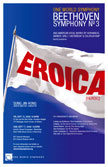 One World Symphony's 9-11 Memorial Concert
One World Symphony's 9-11 Memorial Concert
by Gregg Deering
One World Symphony is trying a novel approach to their 9/11-remembrance concert. The concert is structured around Beethoven's Third Symphony, know as the Eroica or Heroic Symphony. In between the movements of the Eroica, One World Symphony's Artistic Director and Conductor, Sung Jin Hong, has programmed vocal works by Barber and Hovhaness, as well as world premieres by Stan Grill, Carlos Castañeda Jr., and Jihwan Kim's symphonic arrangement of Coldplay's Fix You,
Beethoven originally intended the symphony as an homage to Napoleon, titling the symphony Bonaparte. Beethoven initially felt that Napoleon personified the heroic character that embodied Beethoven's (then revolutionarily dangerous) notion of individual freedom. Beethoven would soon withdraw his dedication when reality showed that the champion of democracy turned out to be another tyrant.
The symphony does not have a "program," but it is "about" freedom as an ideal; the work alludes to trials, triumph and sacrifice and ultimately (meaning in the fourth movement) liberty as a Promethean gift to man.
One World Symphony Performs During Adrienne Metzinger and Sung Jin Hong's Wedding in New York City
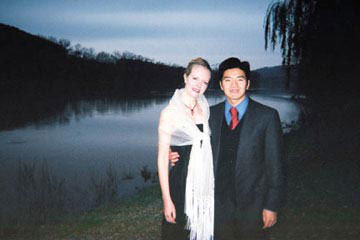 After
six years of courtship, One World Symphony founding members Adrienne
Metzinger and Sung Jin Hong will tie the knot. As an encore to
One World Symphony's recently sold-out Town
Hall debut in March, conductor Sung Jin Hong proposed to
Adrienne Metzinger in front of over 1,500 people.
After
six years of courtship, One World Symphony founding members Adrienne
Metzinger and Sung Jin Hong will tie the knot. As an encore to
One World Symphony's recently sold-out Town
Hall debut in March, conductor Sung Jin Hong proposed to
Adrienne Metzinger in front of over 1,500 people.
During the wedding ceremony One World Symphony will perform Gustav Mahler's Adagietto from his Fifth Symphony, Johann Sebastian Bach's Concerto for Oboe and Violin, music from the films Cinema Paradiso and Star Wars, and a new work by Sung Jin Hong. The wedding ceremony will be held on Saturday, October 21 at 10:45 a.m. at St. Ann and the Holy Trinity in Brooklyn Heights and will be open to the public.
One World Symphony Performs During Adrienne Metzinger and Sung Jin Hong's Wedding in New York City
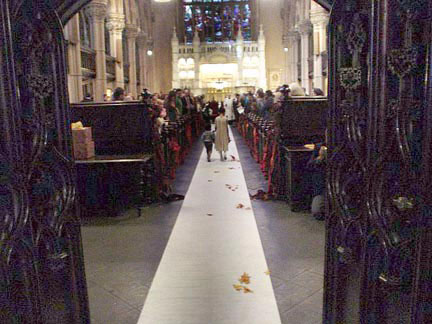
The children scattered leaves rather than flowers.
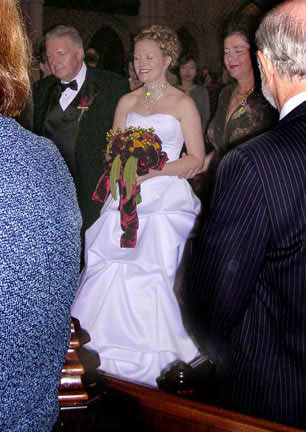
Bridesmaid Rebecca Kessler made Adrienne's dress.
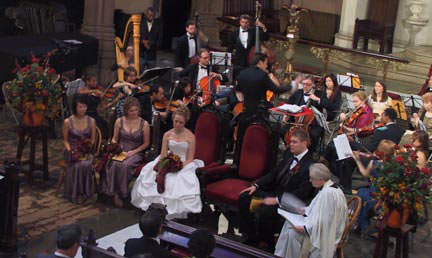
The guests and wedding party listen in rapt admiration as groom Sung Jin Hong conducts Mahler's Adagietto.
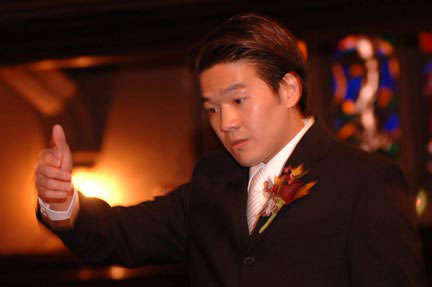
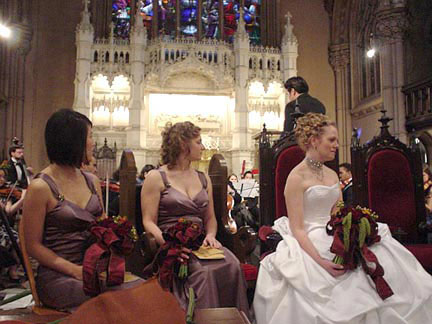
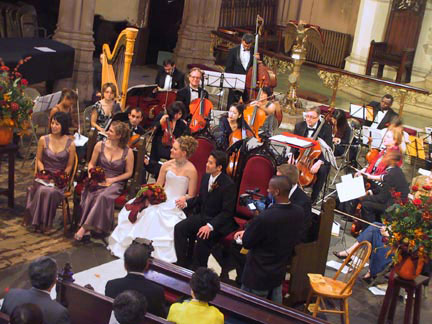
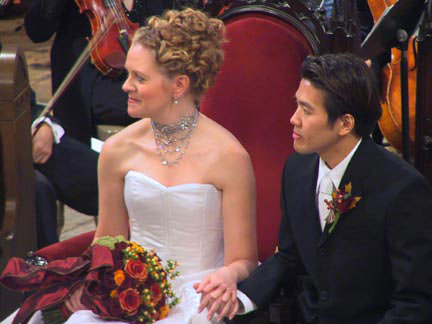
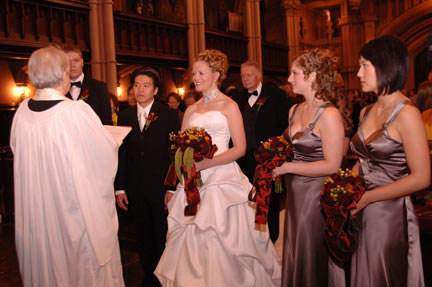

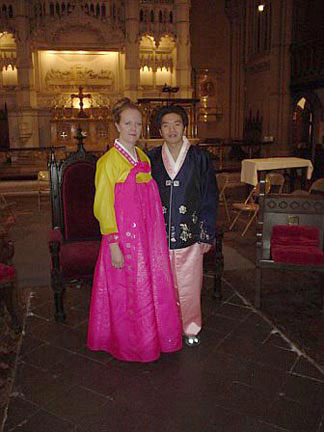
Adrienne and Sung Jin wearing their hanboks, traditional Korean attire.

Both the Metzinger and Hong families, from near and far.
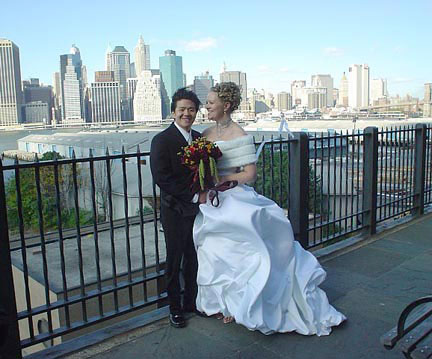
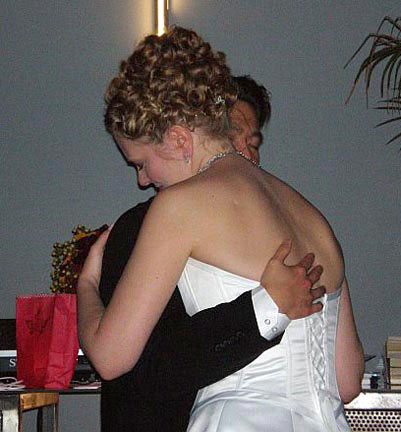
Their first dance as husband and wife.
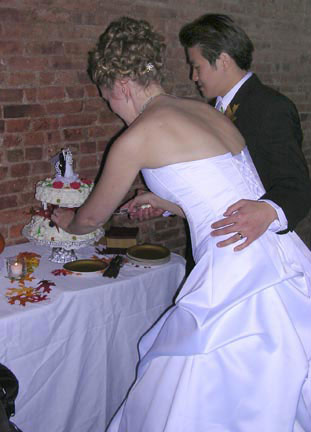
Cake generously provided by Jean Wellington.
Photos: Jill Kaplan, Rick Knecht, Ronald Metzinger, Peter Meyers, Kenson Noel Photography
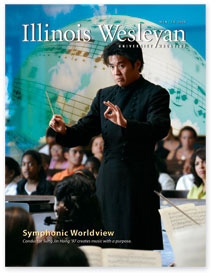 Uncommon Chords: Illinois Wesleyan Magazine's cover feature on conductor Sung Jin Hong and One World Symphony
Uncommon Chords: Illinois Wesleyan Magazine's cover feature on conductor Sung Jin Hong and One World Symphony
Making music with the power to unite, Sung Jin Hong '97 and his One World Symphony offer something different to New York City's crowded cultural scene.
Story by Gary E. Frank
Outside, it is a sun-kissed autumn afternoon. Inside the cavernous sanctuary of Ansche Chesed Synagogue on Manhattan's Upper West Side, Sung Jin Hong '97 is generating his own kind of light. Turning from his conductor's podium, he faces the audience to lead them in a rehearsal of their part of the upcoming concert program, singing the final eight bars of Coldplay's rousing rock anthem "Fix You."
"We can do better than that, people," Hong gently chastises. "It's not a sad song; it's supposed to be uplifting."
"Lights will guiiiide you home, And igniiite your bones and I will tryyy to fix you." Voices from the audience now merge more confidently with the orchestra's winds, strings, and chorus and the pop hymn to a different kind of sanctuary fills the synagogue with a warm and hopeful sound.
Such moments epitomize what Hong has sought to do since founding One World Symphony (OWS) six years ago. Breaking down barriers between performers and spectators, classical and new music, art and daily life, Hong invites you to join him in a communal process of creative healing -- if not to be "fixed," at least to feel uplifted, even in the face of uncertainty and suffering.
Hong's artistic philosophy was put to the test when terrorists struck the World Trade Center in New York City on Sept. 11, 2001. At that time, OWS was only a few months old. Scheduled to give a concert just days after the attacks, Hong and his collaborators decided to scrap their planned program and instead performed Requiem Mass in D minor, Mozart's final piece before his death, as a benefit concert for families of firefighters who died in the Twin Towers.
"It was such a healing event," Hong later told music reviewer H. Michael Jahilil. "All the performers and audience members felt something beyond the music; we really connected with what Mozart wrote."
Generating such feelings is what keeps One World Symphony vibrantly alive -- although that life is lived mostly on a shoestring. A non-profit organization, OWS sells tickets for a fraction of the price of what New York concert halls typically charge and also sponsors inner-city students and their parents who would otherwise not be in a position to afford classical concerts. The symphony depends on donations to cover much of its production costs, and offers musicians, at most, a small honorarium (most work for free) and a buffet-style spread. But there is no shortage of instrumentalists and vocalists who want to add their talents to the One World mix.
"It's a small miracle, by New York standards," says Adrienne Metzinger-Hong, the maestro's wife and One World Symphony's managing and marketing director.
A miracle? Perhaps, but certainly no mystery to those who work with Hong.
"He [has] an infectious spirit and he's a generous man," says Rod Gomez, a professional baritone who is also OWS's artistic advisor and stage manager. "He brings that to his performances and to his workings with colleagues.
"He's a passionate music maker," Gomez adds. "And everybody loves the opportunity to make great music."
*****
A day before the concert at the Ansche Chesed Synagogue, Hong is seated in a sushi restaurant a few blocks away, discussing the symphony's 2006-07 season, the theme of which is "Heroes, Anti-Heroes, and Femmes Fatales." Five different programs will carry this theme, highlighted by a one-night-only appearance Sunday, March 11, in Manhattan's venerable Town Hall. All the other concerts are held on Fridays at a Brooklyn Heights church, followed by a Sunday performance at the Ansche Chesed temple."We have a very loyal following in Brooklyn, much more so than in Manhattan," Hong explains between bites of General Tso's shrimp.
The season's opening concert in Brooklyn Heights, which drew nearly 300 people, was designed as a "9/11 Tribute to Our Heroes." Interwoven between a performance of Beethoven's Symphony No. 3, better known as Eroica, were new or lesser known works by modern composers, as well as the symphonic arrangement of "Fix You."
The concert program, which was repeated on Sunday, featured nearly 100 musicians, including the 40-piece orchestra, another 40 in the chorus, and 15 guest singers from New York City's Special Music School, the first public school in America set up specifically for musically gifted youngsters.
Hong, who is the symphony's artistic director as well as its conductor, chose Eroica as the season opener because it "epitomizes heroism." ("Eroica" is Italian for "heroic.")
"Beethoven may have been inspired to compose Eroica because he originally saw Napoleon as a heroic figure," says Hong. "He was also inspired by democratic ideals. Eroica portrays the character of a hero in all its manifestations: battles, struggles, grief, resignation over loss, and redemption."
Hong has long been attracted to the musical expression of such themes. An early influence was John Williams' sweeping, heroic score for the original Star Wars movie trilogy.
"I loved Star Wars, even before I could speak English," says Hong, whose family emigrated to the United States from Seoul, South Korea, in the mid-1980s. "It had everything. It was romantic, there was good versus evil, and it reflected a great measure of Eastern philosophy."
Music was an abiding presence in Hong's life from childhood. Among his earliest memories are of hearing his mother singing psalms in Korean while working in the family garden during the evening.
When the Hongs first arrived in America they lived near family in California before moving to Peoria, Ill., where more relatives had settled. Their arrival in the Midwest began a process of assimilation that Hong often found frustrating. At the urging of family members, his parents gave their two children Western names, with Sung Jin being dubbed "David" and his sister, Jahee, "Juliette." A few years ago, Hong decided to take back his given name.
"If a Westerner moved to Korea and actually lived there, would he consider adopting a Korean name? Probably not," he says.
While Hong's adjustment to living in the Midwest tended to be restless, he feels he thrived academically, if not always socially, at Illinois Wesleyan. A music major who finished one class shy of a second major in religion, Hong considers David Vayo, professor of composition and theory, as especially influential.
"Professor Vayo was always incredibly generous and supportive. He emphasized that if you're to succeed in any field you need to have a strong grounding in the fundamentals," says Hong.
Vayo vividly recalls his former student. "His work in my classes was first-rate, and he participated in class more frequently than any other student. (Sung Jin) enhanced his formal education by reading and studying a great deal on his own, and reached out to his fellow students through a popular series of listening sessions."
The first time Hong participated in the new-music concert series at IWU, Vayo recalls, he conducted the premiere of a work by Carleton Macy, professor of composition and theory at Macalester College. "(Sung Jin) rose to the occasion beautifully, and his subsequent performances on the series were always highlights.
"Even when he was an undergraduate, his conducting eloquently showed his attentiveness to both fine nuance and large-scale form," continues Vayo. "He was deeply involved at all times in bringing out the emotional expression of the music, and succeeded admirably in moving performers to do the same."
Hong believes the "strong grounding in fundamentals" Vayo taught compares favorably with lessons imparted by successful athletic coaches.
"A good conductor needs to be a good coach no less than someone like Dean Smith or Mike Krzyzewski," says Hong, referring to two college basketball legends. "You're teaching constantly and looking for the best ways to get the best out of people -- to get them to do things they didn't think they could do."
Hong honed his conducting skills with a year of study at the famed Konservatorium der Stadt Wien in Vienna, Austria, during his senior year of college. There, he earned an artist's diploma and won the institution's Maria Theresia Silver Medal Award. After returning to the U.S., Hong continued his studies, earning a master's degree in conducting at Bard College. But perhaps the biggest "breakthrough" experience, he says, was when New York Philharmonic conductor emeritus maestro Kurt Masur personally chose Hong to conduct in public masterclass and a concert with him at the Manhattan School of Music Symphony.
"In front of a public audience," Hong recalls, "Maestro Masur said that 'you've got "it" -- you've got what it takes.' He gave me the freedom to convey any conducting gestures to make music with my fellow musicians in the orchestra. His generous spirit encouraged me to only focus on the music and inspire the musicians to make music together."
Hong honed the lessons he learned in college and graduate school while working for several years as a conductor and music director of the Peoria Sinfonietta and Peoria Players Theatre Company. In 1999, he made the decision to move to New York City. The early years weren't easy; Hong's first home was a Harlem youth hostel. He played violin and piano in cafes, tended bar, and worked as a caterer.
*****
The genesis of One World Symphony happened one year later. Over coffee, he and some musician friends -- including his future wife, Adrienne -- decided to combine their talents to present a holiday concert centered around performances of The Nutcracker Suite and composer Benjamin Britten's Ceremony of Carols.
Hong realized that New York City was fertile ground for a symphony that would give new artists a chance to collaborate in a welcoming environment. For himself, Hong says, it was an opportunity to "conduct and play some of the greatest symphonies, operas, oratorios, and chamber music with some of the most caring, talented professional musicians and generous people from all over the world."
"He manages to pull off these performances in a city like New York, where you can hear some of the greatest musicians performing almost everything," says Stanley Grill, one of the symphony's two composers-in-residence. "Somehow his performances come off. You walk away thinking, 'Hey, I just heard something really unusual and wonderful. You can go to the Met or to the New York Philharmonic and not come away with that feeling.
"He knows the score in excruciating detail, he knows his players, he'll say this will work better with this particular group of musicians," says Grill. "It becomes a collaborative experience rather than just playing notes... as if they were somehow sacrosanct."
The artistic and philanthropic ascent of One World Symphony has been marked by several milestones. In January 2005, Brooklyn Borough President Marty Markowitz even declared a One World Symphony Tsunami Relief Day to recognize OWS's benefit concert for disaster victims. But it was the symphony's performance last March at Town Hall that heralded its true arrival on the city's music scene.
Music legends from Louis Armstrong to Leonard Bernstein have performed at Town Hall, which has been an integral part of New York's cultural history for more than 80 years. Larry Zucker, Town Hall's artistic and executive director, says that inviting One World Symphony to perform there wasn't a hard decision.
"Sung Jin and the One World Symphony were an up-and-coming, fine, young group of musicians that had already garnered several accolades," says Zucker. "We were impressed by their professionalism, their polished, tight sound, their youthful energy, and their willingness to take on new approaches of the classical music genre. ...We received tremendous acclaim from that concert and did not hesitate to invite them back."
At the March Town Hall performance, a sell-out audience of 1,500 heard a crowd-pleasing program of "American Favorites" that included Gershwin's Rhapsody in Blue and Bernstein's Symphonic Dances from West Side Story. As usual, Hong made certain his listeners had a chance to participate.
"It was quite stirring to hear 1,500 people shouting 'Mambo!'" Hong recalls with laugh.
After a final standing ovation, the conductor motioned for silence. With his parents, sister, and future in-laws in the audience, Hong dropped to one knee and proposed to a thoroughly surprised Metzinger, who was seated in the balcony. She was then escorted down to the stage, where Hong once again got down on his knee and placed the ring on her finger.
"Whether the concert went well or not, it didn't matter," Hong says. "I was going to propose.
"The audience, needless to say, went wild."
When One World Symphony returns to Town Hall this March, Hong will likely have a few more surprises up his formal black sleeve. To those who know him, however, his program choices will come as no surprise: a selection of famous film scores that includes John Williams' Star Wars Suite.
So close to Hong's heart is Williams' music that he even requested that "Anakin's Theme" from Star Wars, The Phantom Menace: Episode 1, be performed by OWS musicians at his wedding to Adrienne on Oct. 21, 2006. In the wedding program, Hong wrote that the theme, foreshadowing Anakin's "ultimate sacrifice, tragedy, and redemption," was dedicated to his own parents. Similar to many Korean immigrants, my parents have a strong sense of sacrifice so that my sister and I may be prosperous. They sold many of their personal belongings to immigrate to the 'free' world, even their wedding bands."
*****
Finishing his meal at the sushi restaurant, Hong ordered delivery of assorted appetizers and main dishes to serve the musicians playing at Ansche Chesed the next day.
"There are more than 70 musicians volunteering tomorrow. There are concerts going on every weekend in New York City, and some of them could have taken paying jobs but decided to play with One World," he says. "Since everyone is volunteering, I'm never sure if everyone is going to show up."
But show up they do. Joan Dawidziak, a former nurse and the symphony's principal oboist, hasn't missed a concert in five years.
"What he has done is nearly impossible in this economy because there's not much money for the arts unless something is already built," says Dawidziak. "I would never have had the chance to play in an orchestra like this because I was told I was too old to play oboe."
Vayo is not surprised at his former student's achievements with One World Symphony, given the reaction generated by Hong's conducting while he attended Illinois Wesleyan.
"(Sung Jin) has the strongest leadership qualities of any young musician I have ever known. His listening sessions, and a student orchestra he organized, created a great deal of buzz and enthusiasm -- so much so that the music faculty decided to curtail the activities of the orchestra because it was pulling too much of the music students' time and energy away from their curricular musical activities," Vayo recalls.
While gaining a sponsor like Town Hall was a significant milestone for One World Symphony, the ensemble is still a long way from considering itself established in the sense of the New York Philharmonic or other major orchestras. Among Hong's aspirations is that his symphony will have a permanent home someday.
In the meantime, Hong (who also teaches music at a private school in Harlem) continues to devote as much as 60 hours each week to One World Symphony. It doesn't tire him, he says, "because I am living my dream."
And how does Hong manage to keep his dream alive, when others might become discouraged and walk away? His wife and longtime collaborator, Adrienne Metzinger-Hong, offers this insight: "What I have come to realize about Sung Jin is that he has almost no fear. ...Sung Jin doesn't seem to be afraid to try anything, do anything, ask anything. The idea of failure is always at the back of his mind, like a question... but it never prevents him from going forward with something. ...That's why he, we, and One World have grown."
Or, as one of Star Wars' heroic characters said, "Try not. Do or do not, there is no try."




